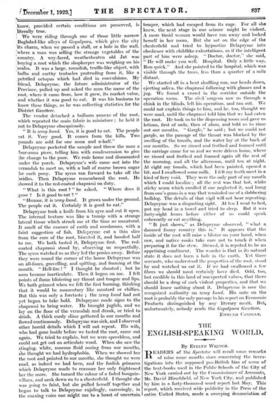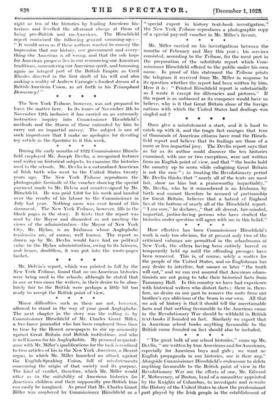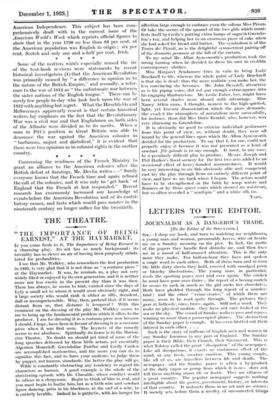THE
ENGLISH-SPEAKING WORLD.
By EVELYN WRENTCII. READERS of the Spectator will recall some remarki of mine some months since concerning the inves- tigations into the supposed pro-British bias of some of the text-books used in the Public Schools of the City of New York carried out by the Commissioner of Accounts, Mr. David Hirschfield, of New York City, and published by him in a forty-thousand word report last May. This report, which received wide publicity in the Press of the entire United States, made a sweeping denunciation of eight or ten of the historieS by leading American his- torians and levelled the all-round charge at them of being pro-British and un-American. The Hirschfield report contained the following general summing-up :- " It would seem as if these authors wanted to convey the impression that our history, our government and every- thing else American is all wrong, and that the sole hope for American progress lies in our renouncing our American traditions, surrendering our American spirit, and becoming again an integral part of the British Empire as Cecil Rhodes directed in the first draft of his will and also making a reality of Andrew Carnegie's fondest dream of a British-American Union, as set forth in his Triumphant Demoeracy! " • * • * The New York Tribune, however, was not prepared to leave the matter here. In its issues of November 5th to November 12th inclusive it has carried on an extremely instructive inquiry into Commissioner Hirschfield's methods and the fitness of those entrusted by hini to carry out an impartial survey. The subject is one of such importance that I make no apologies for devoting my article in the Spectator to it this week. .
During the early months of 1922 Commissioner Hirsch- field employed Mr. Joseph Devlin, a recognized lecturer and writer on historical subjects, to examine the histories used in the schools. Mr. Devlin is a naturalized American of Irish birth who went to the United States twenty years ago. The New York Tribune reproduces the photographic facsimile of the voucher showing the special payment made to Mr. Delvin and counter-signed by Mr. Hirschfield. Ile was paid £400 for his work and handed over the results of his labour to the Commissioner in July last year. Nothing more was ever heard of this document. The New York Tribune, however, fills in the blank pages in the story. It hints that the report was read by the Mayor and discarded as not meeting the views of the administration—the Mayor of New York City, Mr. Hylan, is an Irishman whose Anglophobe tendencies are, of course, well known. The report as drawn up by Mr. Devlin would have had no political value to the Hylan administration, owing to its fairness, and hence, doubtless, it was put into the waste-paper basket.
* * * *
Mr. Delvin's report, which was printed in full by the New York Tribune, found that no un-American histories were being used in the schools, although he stated that in one or two cases the writers, in their desire to be abso- lutely fair to the British were perhaps a little bit too ready to accept the British point of view.
* *
Minor difficulties such as these arc not, however, allowed to stand in the way of Your good Anglophobe. The next chapter in the story was the calling in by Commissioner Hirschfield of Mr. Charles Grant Miller, a free-lance journalist who has been employed from time to time by the Hearst newspapers to stir up animosity against Great Britain and British institutions, and who is well known for his Anglophobia. My personal acquaint- ance wit li Mr. Miller's qualifications for the task is confined to two articles of his in the New York American, a Hearst organ, in which Mr. Miller launched an attack against the English-Speaking Union, full of misstatements concerning the. origin of that society and its purpose. The kind of verdict, therefore, which Mr. Miller would utter as to the suitability of American histories for American children and their supposedly pro-British bias can easily be imagined. As proof that Mr. Charles Grant -Miller was employed by Commissioner Hirschfield as a " special expert in history text-book investigation,", the New York Tribune reproduces a photographic copy of a special-pay-roll voucher in Mr. Miller's favour.
* Mr. Miller carried on his investigations between the months of February and May this year ; his services consisted, according to the Tribune, for the most part in the preparation of the substitute report which Com- missioner Hirschfield offered to the public under his own name. In proof of this statement the Tribune prints the telegram it received from Mr. Miller in response to its question whether the report had been written by him. Here it is : " Printed Hirschfield report is substantially as I wrote it except for illiteracies and pictures." If the report is as unbiassed as its composer would have us believe, why is it that Great Britain alone of the foreign nations with which the United States had dealings was singled out ?
* * * $
Once give a misstatement a start, and it is hard to catch up with it, and the tragic fact emerges that tens of thousands of American citizens have read the Hirsch- field report and believe that its findings are those of a more or less impartial jury. The Devlin report says that as far as its author could discover the ten histories examined, with one or two exceptions, were not written from an English point of view, and that " the books hold the country up to scorn while eulogizing Great Britain is not the case " ; in treating the Revolutionary period Mr. Devlin thinks that " nearly all of the texts are most fair, show no bias but a praiseworthy impartiality," Mr. Devlin, who be it remembered is an Irishman by birth and cannot therefore be accused of partisanship for Great Britain, believes that a hatred of England lies at the bottom of nearly all of the Hirschfield report. " I am sure," he declares, ," that all decent, fair-minded, impartial, justice-loving persons who have studied the histories under question will agree with me in this belief."
* * * *
How effective has been Commissioner Hirschfield's work is only too obvious, for at present only two of the criticized volumes are permitted in the schoolrooms of New York, the others having been entirely barred or temporarily held up until the offending passages have been removed. This is, of course, solely a matter for the people of the United States, and no Englishman has any desire to interfere, but sooner or later " the truth will out," and we can rest assured that American educa- tionists are not going to take their historical facts from Tammany Hall. In this country we have had experience with historical writers who distort facts ; there is, there- fore, no desire on our part to remove the mote from our brother's eye oblivious of the beam in our own. All that we ask of history is that it should tell the ascertainable facts and that nothing favourable to the American cause in the Revolutionary War should be withheld in British text-books if founded on fact. Similarly we expect that in American school books anything favourable to the British cause founded on fact should also be included.
* * * * " The great bulk of our school histories," sums up Mr. Devlin, " arc written by true Americans and for Americans, especially for American boys and girls ; we want no English propaganda in our histories, nor is there any.". Alongside Commissioner Himehfield's endeavour to delete anything favourable to the British point of view in the Revolutionary War arc the efforts of one, Mr. Edward F. McSweeney, of Boston, head of 'a committee appointed by the Knights of Columbus, to investigate and re-write the History of the United States to show the predominant part played by the Irish people in the .establishment of American Independence. This subject has been com- prehensively dealt with in the current issue of the American World's Work which reprints official figures to show that in the year 1790 no less than 83 per cent. of the American population was English in origin ; six per cent. Scotch and only one and a-half per cent. Irish.
Some of the matters whicll especially roused the ire of the text-book re visors were statements by recent historical investigators (1) that the American Revolution was primarily caused by " a difference in opinion as to the nature of the British Empire," and secondly, a refer- ence to the war of 1812 as `.` the unfortunate war between the sister nations of the English tongue." There can be surely few people to-day who look back upon the war of 1812 with anything but regret. What the Hirschfields and McSweeneys apparently resent is that certain historical writers lay emphasis on the fact that the Revolutionary War was a civil war and that Englishmen on both sides of the Atlantic were divided as to its merits. When a man in Pitt's position in Great Britain was able to denounce the war against the American colonies as " barbarous, unjust and diabolical," it is evident that there were two opinions as to colonial rights in the mother country. * * * * Concerning the readiness of the French Ministry to grant an alliance to the American colonies after the British defeat at Saratoga, Mr. Devlin writes :------" Surely everyone knows that the French time and again refused the call of the colonies, and it was only to ' get back ' at England that the French at last responded." Recent research has enormously increased our knowledge of events before the American Revolution and of its contri- butory causes, and facts which would pass muster in the nineteenth century no longer suffice for the twentieth.




























































 Previous page
Previous page